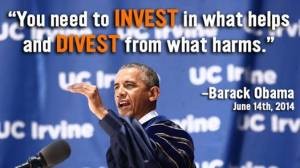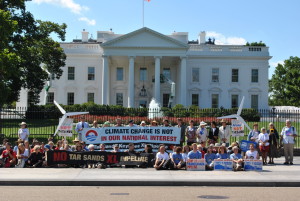As I have discussed previously on this blog, fixing the environmental problems that we currently face will require political action to fix. Lucky for us, there is a major election coming up in 2016 that may really foster in some political change. With an open Presidential seat anything is possible.
As of the day I am writing this, there are four candidates that are definitely running for President. There is one Democrat that has announced and three Republicans. The Democratic candidate is Hillary Clinton. The Republican candidates are Ted Cruz, Rand Paul and Marco Rubio. I thought it would be interesting to look at these candidates and ascertain their perspectives on the environment because one of these people may be the next president of the Unites States.
Ted Cruz:
While Ted Cruz recently acknowledged that climate change does exist to some degree. But Cruz still has his doubts that climate change is happening right now. Also, Cruz holds that c limate change is definitely not a human caused phenomenon. In fact, recently Cruz said on Late Night with Seth Meyers that debates upon this scientific issue should rely on scientific fact. According to Cruz satellites show that the globe is not warming (although climate scientists disagree).
limate change is definitely not a human caused phenomenon. In fact, recently Cruz said on Late Night with Seth Meyers that debates upon this scientific issue should rely on scientific fact. According to Cruz satellites show that the globe is not warming (although climate scientists disagree).
Cruz also believes that Cap-and-trade has no impact of global temperatures. He also supports investment in know energy resources rather than alternative energy. Cruz also voted no to protecting ocean, costal and Great Lake ecosystems.
Rand Paul:
As a true-blue (or rather red) conservative libertarian, Rand Paul thinks  that the government should not have a role in regulating the environment. Paul is against the EPA and does not think that it should be able to put regulations on any private citizen or corporation. He also has voted against animal-welfare legislation multiple times. Basically, Rand Paul wants no part of environmental issues, because in his opinion the government should not have any responsibility to the environment.
that the government should not have a role in regulating the environment. Paul is against the EPA and does not think that it should be able to put regulations on any private citizen or corporation. He also has voted against animal-welfare legislation multiple times. Basically, Rand Paul wants no part of environmental issues, because in his opinion the government should not have any responsibility to the environment.
Marco Rubio:
Marco Rubio, like his republican contenders, agrees that climate does not exist. If it does, he definitely does not believe that climate change is caused by human activity. Rubio also doubts that any actions that we take now would not change the future of the climate or the world. In Florida, the state that Rubio represents in the Senate, the citizens see first hand the e ffects of climate change. With rising sea levels and saltwater contaminating drinking w ater supplies. Floridians are tired of Rubio denying the very climate change that is affecting their lives.
ffects of climate change. With rising sea levels and saltwater contaminating drinking w ater supplies. Floridians are tired of Rubio denying the very climate change that is affecting their lives.
Additionally, Rubio has said he wanted to support fossil fuel industries and would not support alternative energy initiatives. Rubio is also against the regulation the EPA. On the bright side, Rubio does support tax breaks on energy efficient appliances.
Hillary Clinton:
As the only Democrat in the race thus far, it is to be expected that she will have quite a different stance on environmental issues. Clinton believes the science of climate change. Clinton believes that global warming is real and that humans cause it. Clinton supports many of the environmental issues that President Obama has introduced. On e example is Obamas power plant rules that aim to reduce carbon emissions. In addition, Clinton also realizes the connection between empowering women and climate change. Clinton realizes that the secret to stopping climate change is empowering women and if elected she would continue those initiatives.
e example is Obamas power plant rules that aim to reduce carbon emissions. In addition, Clinton also realizes the connection between empowering women and climate change. Clinton realizes that the secret to stopping climate change is empowering women and if elected she would continue those initiatives.
There are some troubling parts of Clinton’s environmental policy as well. She supported fracking world wide while Secretary of State as a way to decrease poverty worldwide. Clinton’s charitable foundation also takes a lot of donations from oil companies. Further, in the past Clinton supported offshore drilling. Finally, Clinton has stayed silent about the Keystone XL Pipeline making environmental activists wonder whether or not she would allow it to be built.
But as expected, Clinton is generally more accepting of government initiatives to preserve the environment.
In many ways, the future of our planet will undoubtedly be affected by who is chosen as the next leader of the free world. That is why I implore you all to stay informed on all candidates that are introduced to the race. And then on that first Tuesday in November I implore you all to go out and make your voice be heard. It is possibly more important now than it has ever been before.

 on arrival in the Gulf Coast this crude oil will be refined and shipped to overseas markets for sale. The Keystone XL Pipeline will not be the first of its kind with other pipelines that not only funnel crude down from out neighbor to the north but also other crude from tar sands. Yet, there has been a largely partisan public debate surrounding this issue for the past 4 years.
on arrival in the Gulf Coast this crude oil will be refined and shipped to overseas markets for sale. The Keystone XL Pipeline will not be the first of its kind with other pipelines that not only funnel crude down from out neighbor to the north but also other crude from tar sands. Yet, there has been a largely partisan public debate surrounding this issue for the past 4 years. truction of the pipeline. The problem is that the numbers surrounding the number of jobs the Keystone Pipeline will create range from exaggerated to hilariously ridiculous. In terms of direction jobs, the Keystone XL Pipeline will end up creating about
truction of the pipeline. The problem is that the numbers surrounding the number of jobs the Keystone Pipeline will create range from exaggerated to hilariously ridiculous. In terms of direction jobs, the Keystone XL Pipeline will end up creating about ment or environmental policy in America. I do not support the construction of the pipeline but honestly the construction of the pipeline itself is neither here nor there. Without the pipeline TransCanada is still going to extract the crude from the tar sands in Alberta. The only difference is that they will have to move it via truck to the gulf coast. It will not change our oil costs, as it will still be sold over sea. A few less temporary jobs will be created but in the end of the day 50 people mean so little to a nation of millions. Generally, I see the construction of the Keystone XL Pipeline as something more symbolic. Construction of this pipeline shows that we as a people are much more willing to spend millions of dollars pumping dirty forms of rude out of the ground than we are willing to support forms of policy that would go towards developing clean forms of energy. What the decision on the Keystone XL Pipeline does do is set a dangerous precedent that America is going to continue to drill its way through the 21st century. Because we are not running out of crude oil, but we are running out of an environment to exploit.
ment or environmental policy in America. I do not support the construction of the pipeline but honestly the construction of the pipeline itself is neither here nor there. Without the pipeline TransCanada is still going to extract the crude from the tar sands in Alberta. The only difference is that they will have to move it via truck to the gulf coast. It will not change our oil costs, as it will still be sold over sea. A few less temporary jobs will be created but in the end of the day 50 people mean so little to a nation of millions. Generally, I see the construction of the Keystone XL Pipeline as something more symbolic. Construction of this pipeline shows that we as a people are much more willing to spend millions of dollars pumping dirty forms of rude out of the ground than we are willing to support forms of policy that would go towards developing clean forms of energy. What the decision on the Keystone XL Pipeline does do is set a dangerous precedent that America is going to continue to drill its way through the 21st century. Because we are not running out of crude oil, but we are running out of an environment to exploit. respondents believe that there is not sufficient scientific evidence to support that the earth is warming. Further, the poll also showed that these opinions still tended to split down party lines with Democrats and Independents more likely to believe that climate change is a reality. Additionally, the poll showed that younger Americans (18-49) are also more likely to believe in the science of climate change.
respondents believe that there is not sufficient scientific evidence to support that the earth is warming. Further, the poll also showed that these opinions still tended to split down party lines with Democrats and Independents more likely to believe that climate change is a reality. Additionally, the poll showed that younger Americans (18-49) are also more likely to believe in the science of climate change.
 respondents. With 54 percent of Democrats rating dealing with Global Warming a top priority and only 15 percent of Republicans rating it a top priority.
respondents. With 54 percent of Democrats rating dealing with Global Warming a top priority and only 15 percent of Republicans rating it a top priority.